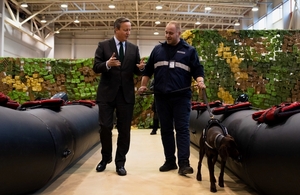Foreign Secretary visits Eastern Europe to shore up support for Ukraine and tackle illegal migration
Foreign Secretary David Cameron visits Bulgaria and Poland to shore up support for Ukraine and promote action to tackle illegal migration.

During the visit, the Foreign Secretary saw first-hand how UK-Bulgarian co-operation is helping to tackle organised immigration crime through practical support and intelligence sharing.
-
Foreign Secretary David Cameron will travel to Bulgaria and Poland this week before meeting counterparts at the Munich Security Conference.
-
demonstrating support to key NATO allies, his trip will build on work to increase defence production and bolster support to Ukraine
-
he will promote action to tackle illegal migration with the UK supporting Bulgaria to stop illegal migrants using the country as a transit route to the UK, with £1.2 million of support
Almost 2 years on from Putin’s illegal invasion of Ukraine, the Foreign Secretary will visit Bulgaria and Poland before travelling to the Munich Security Conference. The trip will underline the UK’s commitment to international security and demonstrate how the UK is increasing operational cooperation for countries around Europe grappling with the huge challenge of illegal migration.
Ukraine will be on the agenda throughout the visit, with the Foreign Secretary focused on work with partners, including Bulgaria and Poland, to ensure Ukraine has the support it needs. Discussions will include how to strengthen Ukraine in the war now, ensure Ukraine wins if Putin prolongs hostilities and to lay the foundation of Ukraine’s long-term future.
The Foreign Secretary will also discuss how the UK is stepping up its support for the key NATO allies, including to build resilience, end dependence on Russian energy and tackle cyber threats and disinformation during talks with his counterparts. Later in the week, the Foreign Secretary will attend the Munich Security Conference, urging allies to boost defence production for Ukraine.
During the visit, the Foreign Secretary is expected to say:
Putin believes he can get away with aggression. That he can wait out the West.
We have the resources, the economic might and the expertise. We need to show that we have the will to see this through.
We must stand up for freedom and match our words with action. On sanctions. On support for Ukraine. On defence production.
And we must show unity – we must all stand with Ukraine and let them – and Russia – know that they have our support for the long haul.
The Foreign Secretary will also see first-hand joint work taking place on illegal migration in Bulgaria. This will include visiting Border Force officials in Sofia to understand how UK-Bulgaria cooperation is disrupting the supply of small boats and other parts destined for illegal channel crossings, breaking the business model of people-smuggling gangs.
As a key country on the route of criminals transporting small boats equipment across Europe, the UK is providing £1.2 million of training and capacity support to Bulgaria, including border surveillance drones, vehicle search training, search dog training equipment and thermal imaging devices.
This funding expands the work the UK and Bulgaria are doing to tackle organised immigration crime through increasing intelligence sharing and practical support. Up to 50% of all those using the Balkans as a migration route into Europe are believed to come through Bulgaria, which has become the main transit route for dangerous equipment used to facilitate small boat crossings in the Channel.
In Bulgaria, Foreign Secretary David Cameron is expected to say:
We need to work side-by-side on the challenges that endanger our security and prosperity, such as tackling the scourge of people-smuggling gangs and illegal migration – only by collective resolve can these threats be overcome.
Media enquiries
Email newsdesk@fcdo.gov.uk
Telephone 020 7008 3100
Contact the FCDO Communication Team via email (monitored 24 hours a day) in the first instance, and we will respond as soon as possible.